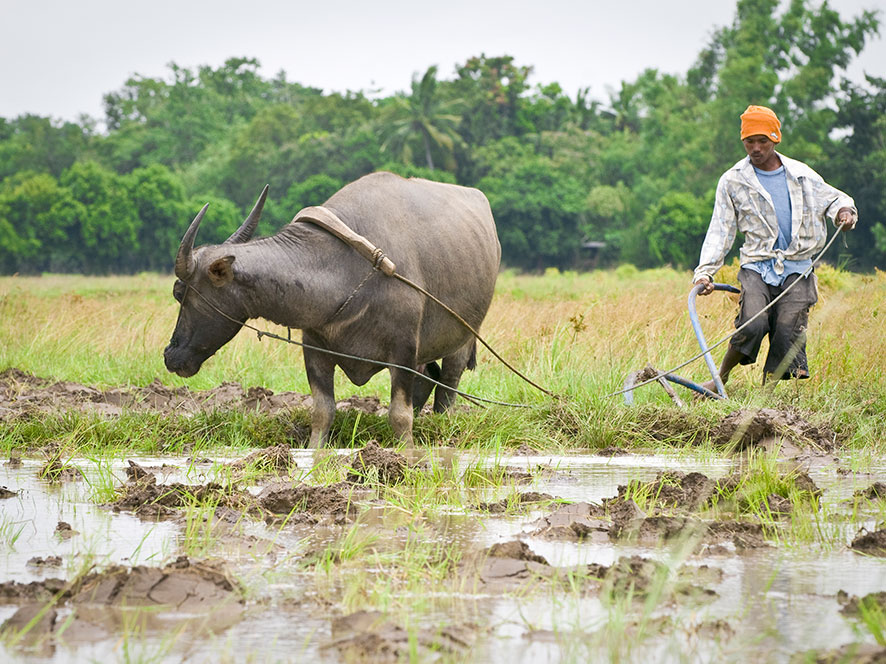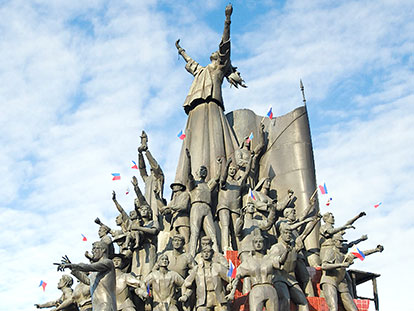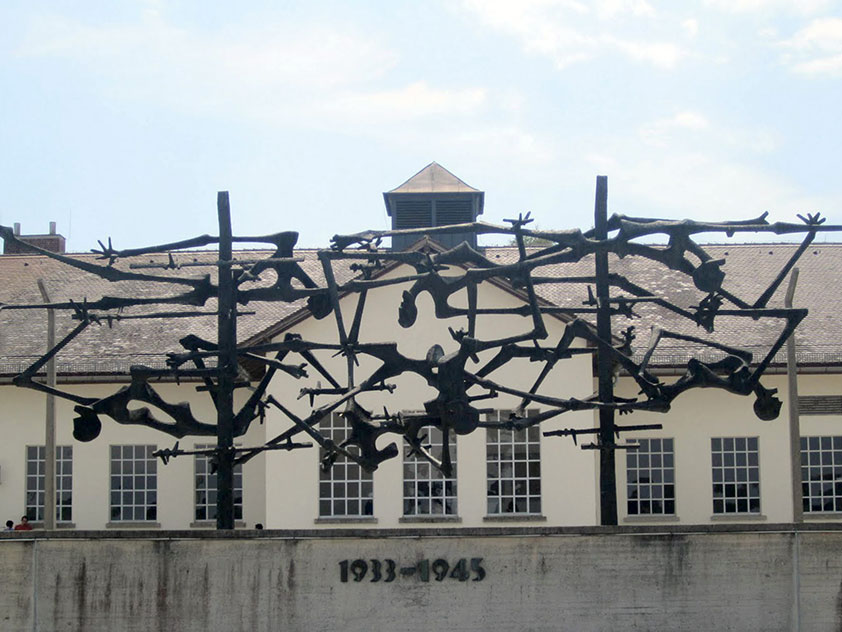In 1940, the German army invaded France and, among thousands, the young African Léopold Sédar Senghor was also captured. In 1928, he had come from Senegal, West Africa, to Paris on a partial scholarship and continued his formal studies at the Sorbonne. He had subsequently started teaching in French universities.
During these years, the exceptionally gifted young African intellectual had discovered the unmistakable imprint of African art on modern painting, sculpture, and music, which had confirmed his belief in Africa’s potential contribution to modern culture. Those were the seeds of what would become Senghor’s famous Négritude intellectual movement.
In 1939, Senghor enrolled in the French army within the 59th Colonial Infantry Division with the rank of private, in spite of his higher education and his later acquisition of French citizenship in 1932. Together with all the French colonial troops, he interned in different camps and, finally, at Front Stalag 230 in Poitiers.
Front Stalag 230 was reserved for colonial troops captured during the war. The German soldiers wanted to execute him and all the others the very same day they were captured, but they escaped this fate by yelling: Vive la France, vive l’Afrique noire! (“Long live France, long live Black Africa!”). A French officer told the German soldiers that executing the African prisoners would dishonor the Aryan race and the German army. That is how they were spared and herded off to the concentration camps instead.
In total, Senghor spent two years in different prison camps, where he occupied most of his time writing some of his most inspired poems. In 1942, he was released for medical reasons. He resumed his teaching career while remaining involved in the resistance against the Nazi occupation.
THE DETERMINED STUDENT
Léopold Sédar Senghor was born in 1906 in the village of Joal on the coast of Senegal, about one hundred kilometers from the capital Dakar. His family had converted to Christianity and Léopold was brought up a Catholic. But the Senghors continued to respect the ancestral religion of the Serer and to appreciate the cultural traits of the ethnic group to which they belonged. Later in his life, Senghor would be a fierce advocate for the “inculturation” of the Gospel, arguing that Christianity in Africa and elsewhere should reflect the local culture, languages and even worldview, and not impose as universal its European expression.
Senghor attended a school founded by the Holy Ghost Fathers, a congregation of Roman Catholic priests and brothers, in a neighboring village, before graduating to a high school in Dakar which was run by the same Catholic mission. He was a brilliant student especially in humanities, Latin and Greek and, for a certain period, he seemed to be inclined to become a Catholic priest, but he was also strong-willed and considered stubborn by his teachers.
Senghor’s schoolmaster, Father Lalouse, was uneasy with the young student’s attitude of, in particular, challenging the prevailing idea that in order to embrace Christianity, Africans had first to rid themselves of their tribal and cultural legacy. Eventually, Father Lalouse gave in and decided that it was better for the young Senghor to join the public high school and complete his degree in that secular environment. It was after graduation that he won a partial scholarship and moved to France.
NÉGRITUDE
With the help of Aimé Césaire, a young man from the French Caribbean Island of Martinique in the mid-1930’s, Senghor initiated the poetic, intellectual and political movement known as Négritude. The choice of the term Négritude – derived from the highly derogatory and racist word “nègre” – was deliberately and proudly appropriated to assert and stress what they believed to be distinctive African characteristics, values, and aesthetics.
This was a reaction against the dominance of the French culture in the colonies, and against the perception that Africa did not have a culture developed enough to stand alongside that of Europe. Building upon historical research identifying ancient Egypt with Black Africa, Senghor argued that sub-Saharan Africa and Europe are, in fact, part of the same cultural continuum, reaching from Egypt to classical Greece, through Rome to the European colonial powers of the modern age. Négritude was, by no means, an anti-white racism, but rather emphasized the importance of dialogue and exchange among different cultures.
Senghor defined the concept in contradistinction to Europe and gave it a more positive meaning. According to Senghor, the Black African is intuitive, but the African mode of experience is far from irrational: the experience that proceeds from intuition is fuller and more comprehensive than that derived from a discursive approach.
In the area of political philosophy, Senghor examined African socialism. For him, socialism is not new to Africans, whose communal principles of social life have been central in pre-colonial times. Residing part time in France, he wrote poems of resistance in French which engaged his Catholic spirituality even as they celebrated his Senegalese heritage. Senghor is the author of several collections of poetry. He also edited an original anthology of work by African poets which carried an introduction by Jean-Paul Sartre who spoke famously of Black Orpheus. Senghor’s thoughts are gathered in five volumes under the title, Liberté (Freedom).
NÉGRITUDE AND CHRISTIANITY
Senghor also co-founded the magazine Présence Africaine with Alione Diop. Présence Africaine represented the efforts of Catholic African intellectuals in dealing with their dual identity as Christians and Africans. Aloune Diop wrote: “The question of the Catholics in the bosom of the Church can be summed up thus: the African Catholics want, above all, to make sure of their double quality as Catholics and Africans. They suffer in Africa the uneasiness of not being able to assume their cultural heritage…It is clear that the solution would be to be able to express their African personality in the very heart of the vitality of Catholicism.”
The vision of the Négritude is born in the context of dialogue with the Christian faith. First of all because in the Négritude, in the very heart of its emergence, there is the influence of a Catholic theologian: Pierre Teillard de Chardin. Moreover, the respectful attention and assimilation of the humanistic culture on the part of the Négritude reveals an opening to Catholicism which had deeply imbued that cultural heritage, even if not identifying totally with it.
Thus, the Négritude’s disposition to “dialogue,” and not to “contrast,” has allowed the Christian presence to remain as something that can enrich African culture and vise versa, and not as if it were something alien or heterogeneous. The Négritude movement, with its deep appraisal of the Black African culture, undoubtedly, promoted the “inculturation” of Christianity in Africa and the “Africanization” of the Catholic Church, in particular.
Remarkable and touching is the following statement of the Cameroonian Catholic thinker M. Hebga: “Truly, Jesus Christ is ours and close to us because of the depth of His humiliation as a human being. I can’t help loving Him. So doing, I am not a fugitive or a degenerate. I am a son of my people…A truth imposes itself: whatever the historical vicissitudes of Christianity, with Christ we have a blood-brother in humiliation. Let us not make Him guilty of the weakness of human beings. Christianity is a hundred miles away from imperialism. The message of Christ has never allowed itself to be used as an instrument of human domination; it has always exploded in the hands of those who would have liked to make use of it in order to crush their fellow human beings… This irresistible dynamism ought to create a favorable prejudice and a victorious attraction.”
THE WISE AND HUMBLE LEADER
Having entered politics, Senghor was elected as Senegal’s first president on September 5, 1960. In a way, the country Senghor inherited was politically unique among its neighbors. Under colonialism, Senegal had had a special status among French West African colonies and, as a consequence, those areas had a long tradition of democratic multiparty elections and a number of political parties were already active when Senegal became independent.
Senghor thus took over a country with some kind of democratic legacy, but this was initially short-lived under his presidency. In 1962, his political ally, long-time friend and prime minister, Mamadou Dia, was accused of plotting a coup and imprisoned for life, but released after twelve years in 1974. Senghor responded to the perceived threat by establishing a one-party authoritarian system like so many of its neighbors.
Still, it was perhaps the poet in Senghor that prevented him from going to the extremes of most authoritarian leaders. It was perhaps the poet in him, too, that led him to do two things typically unheard of among those with such a tight grip on power. Firstly, in 1976, after 14 years of single-party rule, Senghor reversed his earlier thinking and decided that Senegal should take up its democratic traditions again. As a start, three political parties were officially recognized. More importantly, however, the press was also given far greater freedom, and a culture of fiercely independent journalism developed rapidly.
Secondly, in 1980, Senghor resigned from politics and retired in France. He is one of only two African heads of state who surrendered power peacefully on their own initiative. The other was Julius Nyerere, the saintly Catholic politician, the Father of Tanzania’s independence. Though many problems remain, Senegal today is seen as a beacon of democracy and stability in the region – thanks to Senghor who is celebrated as providing a valuable example for leaders across Africa.
“ONE WHO CANNOT BE ASHAMED”
Having freely resigned from the presidency, Senghor spent the last years of his long life in France, his country of adoption, attending to his beloved poetry and studies. He was assisted by his devout second wife, Colette Hubert, who had been his French secretary. Since she entered holy matrimony in 1957 with then-Congressman Senghor, she did not have an easy life, but followed her husband with unfailing devotion and became First Lady of Senegal. She suffered with him the loss of their only child, Philippe, in 1981. She outlived her husband. Senghor had other two children from his first wife.
Senghor’s legacy, without doubt, justifies his middle name, Sédar, which is translated as “one who cannot be ashamed.” In the context of the Négritude movement, he coined the famous sentences:”Emotion is Black, Reason is Greek” and “Négritude is the totality of the cultural values of the Black World.” Senghor’s beliefs, however, extended well beyond those axioms and, until the final years of the 20th century, he continued to work on the open-ended question of Black cultures and Black arts.
Senghor strongly advocated dialogue, encounter, and the coming together of cultures, claiming that metissage (or interbreeding) – in the past as well as in the future – is the necessary condition of any great civilization. Even in politics, he left a strong mark. The Father of Senegal’s Independence, he was a prominent statesman who led by example and helped advance democracy in a continent long considered ‘forgotten by human rights.’
He discovered the roots of his socialism in the African tradition and avoided the Marxist and anti-Western ideology, favoring the maintenance of close ties with France and the Western world. This is seen by many as a contributing factor to Senegal’s political stability: it remains one of the few African nations never to have had a coup and always to have had a peaceful transfer of power – not a small achievement!
But Senghor was a poet first and foremost. He once famously declared that if he had to choose between his accomplishments as a poet, a thinker or a statesman, he would like his legacy to be that of a poet. The best way to comprehend such a remark, coming from a man who is considered to be one of the most important African intellectuals of the 20th century, and one of the heroes of independent Africa, is to understand that he was not really making a choice at all. What Senghor’s declaration really meant was that his philosophy as a thinker was that of a poet and that, as a statesman faced with difficult political choices, he tried to never lose sight of the poet within himself.
Senghor died at his home in France at the age of 95. His funeral was held on December 29, 2001 in Dakar. President Jacques Chirac of France said upon hearing of Senghor’s death: “Poetry has lost one of its masters, Senegal a statesman, Africa a visionary, and France a friend.”














